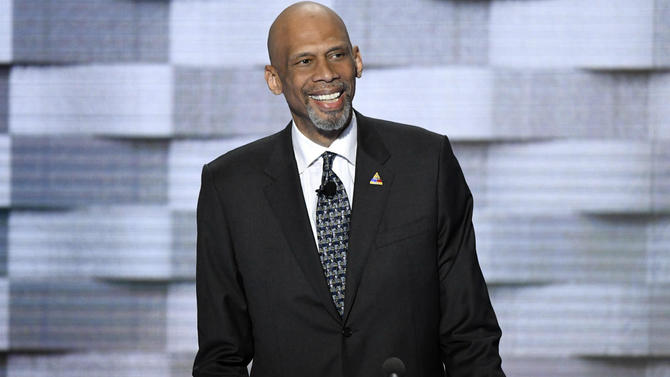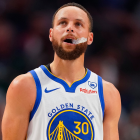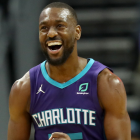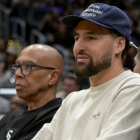
For over 25 years, Coaches vs. Cancer, a partnership between the National Association of Basketball Coaches, and the American Cancer Society, has helped lead the fight against cancer, raising over $100 million for the ACS.
Kareem Abdul-Jabbar, the NBA's all-time leading scorer, and a cancer survivor himself, has been at the forefront of that fight. For his efforts, he will be honored at halftime of Saturday's Coaches vs. Cancer game between Illinois and UNLV in Las Vegas. Ahead of that game, CBS Sports talked to Abdul-Jabbar about his work on the fight against cancer, as well as a number of other topics.
The following has been edited for brevity and clarity.
CBS: As a basketball player and someone who survived Leukemia, you joining up with Coaches vs. Cancer is a natural fit, but how did that partnership come about?
Kareem Abdul-Jabbar: I think it goes back to when I got diagnosed. I had no idea these things would affect my life the way it did. I was 60 years old, no problems. I had lived a healthy lifestyle, and then all of a sudden I get Leukemia. I get diagnosed, and that just changed everything. Also the fact that one of my best friends, we went to high school together, he was an actor. He passed away. He was diagnosed on Day One, he was dead on Day 35.
I'm looking at that, and it changes your life. That experience made me prioritize my time different. Coaches vs. Cancers is a natural fit because I wouldn't be here if it wasn't for cancer research, for all the research that went to Leukemia, that figured out the treatment for the type of cancer I have. It's keeping me alive. Fifteen to 20 years ago, my diagnosis would have been a death sentence.
It's a good fight, I'm glad I'm involved. I'm glad I got the good sense to participate. I'm happy with what's going on. It's neat because you can see the affect. My doctor said, 'Hey man, all my patients used to die. Two or three years I'd treat 'em and then they'd die. Now, I lose contact with them because they stay alive and keep living their lives an move on.' He says it's really changed him. He says he has a much better outlook on life because he isn't dealing with death all the time.
Speaking of the fight against cancer, what would you say is the best way for people to get involved?
KAJ: Your regular, average person ... they don't have a lot of money to give. But they can give their time. They can volunteer time. You know someone who's going through it, give them a ride, go to the store for them, take them to the movies. Just be there for that person while they contend with fighting for their life.
That kind of help is meaningful. It's not cash, but it has tremendous value. You will absolutely make an impact like that. And the local chapters of the American Cancer Society, they can tell you how you can help -- you know for volunteers that have a couple hours each week that want to help.
Changing the subject to basketball. I wanted to ask you about Lonzo Ball in regards to pressure and expectations. You obviously faced a lot of pressure and expectations coming into the league, and now Lonzo is dealing with as much pressure and expectations as maybe anyone in the past few years. How do you think those expectations -- from fans, media, family, etc. -- shape an athlete's life, an athlete's career?
KAJ: I don't think it should be any big thing. Because any person that gets to play professional sports and is focused on that, and knows what all of the ins and outs of it are before they even get there. I don't think it's any mystery as to what the lifestyle is all about.
I also wanted to ask you about Giannis Antetokounmpo. Him and other players have taken the big man position to a new level. Did you ever think that this would come along as a natural evolution of the game? That guys 6-11, 7 feet tall are handling the ball and shooting like this?
KAJ: No. In the era I played in, anybody who was seven feet tall wanted to play in as close to the basket as possible because there was no 3-point shot. The fact that there was no premium put on long, low-percentage shooting. So you can't compare.
But I played with the first big guard, Oscar Robertson. He had played forward in college, and he went out to guard. And Oscar was such a talented athlete he could do anything out there on the basketball court. Oscar could do anything. You name it, he could do it. I'm serious. He would have really done well with the 3-point line, because he had good range. They would play H-O-R-S-E a lot, and Oscar would always go out and beat everybody. Because the other guys didn't have the range that he had.
And a tall person can learn those skills just as well as a short person. Bob McAdoo would have done real good [with a 3-point line]. Bob had range, and at 6-11, he would have fit very well today. Tall athletes adapt to the changes in the game, that shouldn't surprise anybody. But height still is an advantage on the court. Put a whole lot of tall guys out there, and the short guys are gonna be pressed even harder.
Moving away from basketball, I wanted to talk to you about the current social climate. In Stand Tall: The Lew Alcindor Story, you said, "we were raised with no peace in the world. There's been no peace since i was born. This leads to confusion. My generation is trying to learn something about it. People, young people, are trying to help each other" This feels very similar to the way that I've grown up, and the current challenges my generation faces. Are there any lessons in terms of social justice and activism that you took from the 1960s and 70s that you think can be applied today?
KAJ: Well I think the issues that are of such prominence today, are the same issues that upset society when I was in college and my early part in the NBA. Racial issues, economic issues, a lot of it's the same stuff. Black Americans still trying to overcome efforts to keep them from voting. That's still going on. It's more subtle now, they don't call us the N-word, or say we're inferior, but they still don't want black Americans voting in places that were the confederacy. So some things change, and some things don't.
You wrote that you were proud of the NFL players who had been kneeling and protesting. But it seems that kneeling before the anthem has been co-opted and isn't as effective as when Colin Kaepernick started doing it. What do you think the next step may be for athletes in terms of protesting against injustice?
KAJ: I haven't thought about what the next step should be. All you can expect from people is to discuss it rationally, and try to figure out what the next step should be. That's all that we can do. And people that take the time and make the effort, it will be appreciated.
You mentioned how the country is still facing similar issues to the 60s and 70s. Do you think that the activism that athletes took part in back then would be received differently today? Because it seems, like for example what's happening with Kaepernick, that people still aren't receptive to that demand for change, that demand for equality.
KAJ: The whole thing that happened around Colin is that people did not want to admit that there was an issue. They chose to pick on his kneeling during the national anthem, and they project their ideas into what Colin was doing. They are saying that Colin was doing it to disrespect our country, but he wasn't. But they didn't want to deal with the issue that Colin was bringing up, which was black people being shot down in the street for no good reason just because they're black. That's the issue, they don't want to talk about the issue. That's why there's the impasse there, because people are refusing to deal with the issue.
Big change of subject, but just really quick before you go. I know you're a big fan of jazz, and obviously a great basketball player, so you could answer this question better than anyone. There's the old saying that basketball is like jazz, and I wondered if you thought that was true.
KAJ: Yeah, I think so. Because the communication between musicians is very spontaneous. You have to react in the moment, and that's what you have to do on the basketball court. You have to react in the moment and understand your guy's abilities, and they have to understand yours. So that type of communication is essential in both.


















